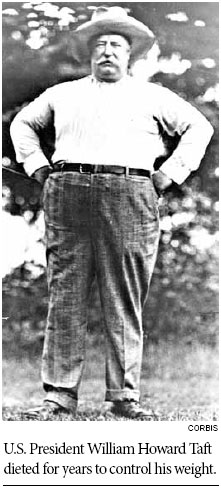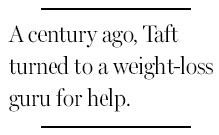The heaviest president and his diet
Updated: 2013-11-03 08:11
By Gina Kolata(The New York Times)
|
|||||||||
William Howard Taft, the only obese man ever to be president of the United States, struggled mightily to control his weight a century ago, worrying about his health and image, and endured humiliation from cartoonists who delighted in his corpulent figure. But research has found that his weight-loss program was startlingly contemporary, and his difficulties keeping the kilos off would be familiar to many people today.
On the advice of his doctor, a famed weight-loss guru, he went on a low-fat, low-calorie diet. He avoided snacks. He kept a careful diary of what he ate and weighed himself daily. He hired a personal trainer and rode a horse for exercise. And he wrote his doctor, Nathaniel E. Yorke-Davies, with updates, often twice a week.
He was ahead of his time. Obesity became a medical issue by the middle of the 20th century, around the time the term "obesity" rather than "corpulence" came into vogue, said Abigail C. Saguy of the University of California, Los Angeles.

Like many dieters today, Taft, 1.8 meters tall, lost weight and regained it, fluctuating from more than 158 to 115 kilos. He was 48 when he first contacted Dr. Yorke-Davies, and spent the remaining 25 years of his life corresponding with the doctor and consulting other physicians in a quest to control his weight.
Taft's struggles are recounted by Deborah Levine, a medical historian at Providence College in Rhode Island. Her findings were published recently in The
Annals of Internal Medicine.
His story, Dr. Levine said, "sheds a lot of light on what we are going through now."
Obesity - often said to be a product of our sedentary lifestyle and fast foods - has been a concern for over a century.
Obesity experts said Taft's experience highlights how very difficult it is for people to lose substantial amounts of weight and keep it off, and how little progress has been made in finding a combination of foods that lead to permanent weight loss.
"Maybe we are looking for something that doesn't exist," said David B. Allison of the University of Alabama. Doctors today would most likely offer Taft weight-loss surgery or drugs, which have a small effect at best. But the diet he was advised to follow would be largely unchanged, Dr. Allison said.
Dr. Levine became interested in Taft's story when she read old newspaper articles that mentioned he was working with Dr. Yorke-Davies to lose weight. She found their letters in the Library of Congress.
Dr. Yorke-Davies was known for creating strict personal diet plans. In a relationship sustained entirely by mail, he advised Taft to lose at least 27 to 36 kilos. Meals were to be eaten at certain times and meats were to be weighed. Taft was to eat a small portion of lean meat or fish at every meal, cooked vegetables at lunch and dinner (no butter), a plain salad, and stewed or baked fruit (unsweetened). He got a single glass of "unsweetened" wine at lunch. The doctor also allowed his own diet product, gluten biscuits, that were produced to his specifications in London. Taft bought them and had them shipped to the United States.
Taft tried to adhere to the program and also employed a personal trainer, known at the time as "a physical culture man."
By April 1905, six months after he first wrote to the doctor, Taft had lost 27 kilos. But even though people told him he looked good, he was "continuously hungry," he wrote the doctor. By the time Taft was inaugurated as president in 1909, he weighed 160 kilos. When he died in 1930, he weighed 127 kilos.

The tale is strikingly modern, obesity experts said. Weighing himself daily and keeping a food diary are "the fundamental tenets of changing behavior," said Dr. Kimberly Gudzune of Johns Hopkins University in Baltimore, Maryland.
Taft got the sort of medical care doctors today wish they could provide. "That is really a model we try to strive for today," Dr. Gudzune said.
She and others were also struck by Taft's persistent hunger pangs.
Dr. Jules Hirsch of Rockefeller University in New York said losing weight and keeping it off amounts to telling the body it is starving. He saw this in his own pioneering studies decades ago. Fat people agreed to live in a hospital ward while they dieted to a normal weight. But they were ravenous and almost every one of them eventually regained the weight that was so painfully lost.
"One of the most important drives we have is to prevent starvation," Dr. Hirsch said.
The New York Times
(China Daily 11/03/2013 page10)